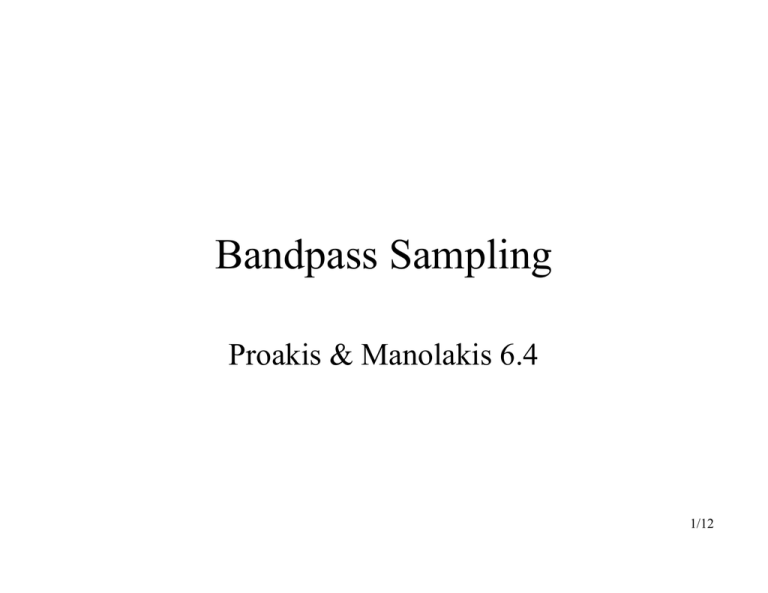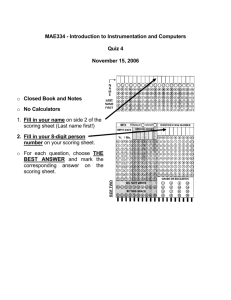Bandpass Sampling
advertisement

Bandpass Sampling Proakis & Manolakis 6.4 1/12 BP-Sampling of RF Signals: Basic Idea Let fH = 3B (This Example Only) X( f ) Need Fs = 2B B = fH – f L fL fH f X( f±Fs ) f X( f±2Fs ) f X( f±3Fs ) f Xs( f ) … … –Fs/2 Fs/2 f BP Sampled Signal is a Down-Shifted Version 2/12 of the RF signal!! BP-Sampling: Simple Case (fH = kB, k integer) Consider the case where fH = kB (k an Odd Integer) X( f ) B B B B -fH -fL B fL fH k=5 for this case f Whenever f2 = LB, we can choose Fs = 2B to perfectly “interweave” the shifted spectral replicas Xs( f ) … … -Fs/2 Fs/2 fL fH k is Odd Here f 3/12 BP-Sampling: Simple Case (Cont.) Consider the case where fH = LB (k an Even Integer) X( f ) B B B B k=6 for this case B B fL fH f Whenever fH = LB, we can choose Fs = 2B to perfectly “interweave” the shifted spectral replicas Xs( f ) … … -Fs/2 Fs/2 k is Even Here f Note: If k is EVEN the spectrum in the 0 to Fs/2 range is flipped. This is not usually a problem since the next step after BP sampling is usually to create the lowpass equivalent signal, which can be done in a way that gives either spectral orientation. 4/12 BP-Sampling: General Case ( fH≠kB) ≤ 2 f H ≤ kFs ( k − 1) Fs ≤ 2 f L 2 fH 2 fL ≤ Fs ≤ 5/12 k k −1 To find the required value of k… re-write as: 2 f H ≤ kFs ( k − 1) Fs ≤ 2 f L 1 k ≤ Fs 2 f H ( k − 1) Fs ≤ 2( f H − B ) Now… solving these for k gives: fH k≤ B k max ⎢ fH ⎥ ≤⎢ ⎥ ⎣B⎦ 6/12 Resulting conditions needed for aliasing-free BP Sampling: 2 fH 2( f H − B ) fH ≤ Fs ≤ and k ≤ k k −1 B 7/12 Using Plot to Visualize Allowed Fs… Given fH and B… draw vertical line at fH/B Dangerous place to operate!!! 8/12 Using Guard Band Idea to Ease Sensitivity to “Change” f L′ = f L − ΔBL f H′ = f L + ΔBH B′ = B + ( ΔBL + ΔBH ) Operating Point must allow this range to fit Resulting Tolerance Range for Fs 9/12 Advantage of BP Sampling A BP-Sampling ADC works like a Mixer and a Baseband-sampling ADC x(t) Bandpass Sampling ADC x(t) LPF BP Sampling Reduces the “Parts Count” Baseband Sampling ADC cos(2πfct) 10/12 ADC Specs: Sample Rate & ADC BW • • Sampling Rate – Fastest Rate at which the ADC can be run – Determines the Widest Signal Bandwidth that ADC can handle ADC Bandwidth – Highest Frequency that ADC’s internal electronics can pass – Determines Frequency Band ADC can handle (e.g. HF, UHF, VHF, etc.) – Crucial for Undersampling Applications Baseband Sampling Low ADC BW Low ADC Fs f Low ADC BW High ADC Fs f Bandpass Sampling High ADC BW Low ADC Fs f High ADC BW High ADC Fs f Narrow Band Wide Band 11/12 www.harris.com ADC’s Fs ADC’s BW 12/12

